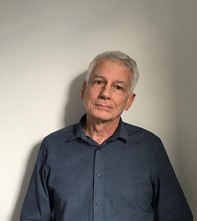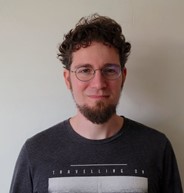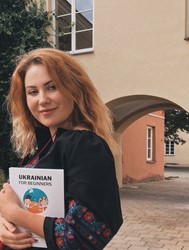Centre for General Linguistics
Institute for the Languages and Cultures of the Baltic


The Centre for General Linguistics, one of the centres functioning within the Institute for the Languages and Cultures of the Baltic, was created in 2018. It is a successor to the Chair of General Linguistics headed between 1994 and 2001 at the Faculty of Philology by Prof. Aleksas Girdenis. We teach various subjects of general linguistics, such as Trends in Contemporary Linguistics, Linguistic Diversity and Language Science, Linguistic Typology, Grammatical Theory and Syntax. We carry out research in both functional and formal frameworks. Our seminars for PhD students and staff provide a forum for theoretical discussion and for the presentation of research work on topics of linguistics at Faculty level and beyond.
Axel Holvoet, distinguished professor

I am a functional linguist working on problems of grammatical semantics, the syntax-semantics interface and historical syntax, usually with a special emphasis on the Baltic and Slavonic languages. The topics I have been interested in over recent years include the middle voice, the functions of irrealis moods, non-directive imperatives, quotativity and echoic use, and most recently the Talmyan typology of event conflation. At Vilnius University I have headed two international research projects funded by the Research Council of Lithuania, on the syntax-semantics interface in Baltic (2012–2015) and on verbal grams in Baltic (2018–2021) respectively.
My recent research topics include the middle voice, non-directive imperatives, the irrealis controversy and the category of mood. In earlier years I have also worked on case marking and grammatical relations, definiteness, verbal aspect, modality, echoic use and other subjects.
Scalar markers between aspect and modality: The case of Lithuanian be-
To appear in Zeitschrift für Slawistik 69, 2024
Preprint on ResearchGate
Towards an enhanced semantic map for imperatives
STUF Language Typology and Universals 76.4, 2023, pp. 635–657
Preprint on ResearchGate
A hitherto unnoticed type of verb-framed construction in Lithuanian and the typology of event conflation
Studies in Language 47.3, 2023, pp. 571–598
Preprint on ResearchGate
Irrealis, aspect, and unanchoring in Slavonic and beyond
Zeitschrift für Slawistik 67.1, 2022, pp. 60–76
Preprint on ResearchGate
Vladimir Panov, associate professor

I am a scholar in linguistic typology and general linguistics. The sphere of my research interests covers such topics as the typology of grammatical categories of the verb, the typology of discourse particles, boundaries between morphology, syntax and discourse, language-particular description of grammatical and discourse phenomena, the areal typology of Eurasia. In my research, I combine the traditional Greenbergian typology based on comparative concepts with elements of multivariate typology, but I am also interested in constructionist usage-based approaches and, recently, practice-oriented frameworks of linguistic anthropology.
I have fieldwork experience studying the living Greek dialects of Italy (Salento) and the Buriat language.
My last personal project (a postdoctoral study, 2018-2020) was devoted to the study of areal patterns of distribution of discourse particles in Eurasia. More recently, I have been involved in “The Baltic verb” project studying aspects of the grammar of the Lithuanian verb in a typological context.
Toward a non-aprioristic approach to discourse-associated devices.
In: Discourse Phenomena in Typological Perspective, ed. Alessandra Barotto & Simone Mattiola, 2023, pp. 13–34,
Amsterdam: John Benjamins
A peculiar Lithuanian particle mat or Mat ją bala, irgi mat dalelytė!
Vilnius University Open Series 16, 2021, pp. 291–308
The marking of uncontroversial information in Europe: presenting the enimitive
Acta Linguistica Hafniensia 52.1, 2020, pp. 1–44
Preprint on Academia.edu
Final particles in Asia: Establishing an areal feature
Linguistic Typology 24.1, 2020, pp. 13–70
Preprint on Academia.edu
Exploring the asymmetric coding of autobenefactive in Lithuanian and beyond
Baltic Linguistics 11, 2020, pp. 343–371
Juk and gi, and “particles” in contemporary Lithuanian: Explaining language-particular elements in a cross-linguistic context
Kalbotyra 72, 2019, pp. 58–86
Alexandre Cremers, associate professor

I am a linguist working on semantics and pragmatics. My research focuses on phenomena at the interface between linguistic meaning and general reasoning, in particular questions, implicatures, and vagueness. My work combines psycholinguistic approaches, traditional formal approaches inspired by logic, and probabilistic / game-theoretic modeling.
My last project “Efficient communication under uncertainty: Vagueness and Implicatures” studied how we manage to communicate efficiently using vague terms such as 'tall' or 'far', and how vagueness interacts with our ability to figure out the speaker's intentions.
I occasionally work on language acquisition, more specifically how children learn to decypher pragmatic meaning.
Exhaustivity and anti-exhaustivity in the RSA framework: Testing the effect of prior beliefs
Cognitive Science 47(5), 2023
Preprint on arXiv
The importance of being earnest: How truth and evidence affect participants’ judgments
Glossa Psycholinguistics 2(1), 2023, pp. 1–17
A rational speech-act model for the pragmatic use of vague terms in natural language
Proceedings of the Annual Meeting of the Cognitive Science Society 44, 2022, pp. 149–155
Interpreting gradable adjectives: Rational reasoning or simple heuristics?
Empirical issues in syntax and semantics 14, 2022, pp. 31–60
Ignorance implicatures of modified numerals
Linguistics and Philosophy 2021
Anna Daugavet, assistant professor

I’m currently interested in the study of grammaticalization and constructionalization, involving aspectual and modal meanings, with the Baltic languages and their neighbours as the main source of inspiration in the form of text corpora and other digital resources. The idea of lexical limitations placed on general rules of grammar and phonology, central to the field, provides a link to a comparative study of linguistic atlases (both traditional dialect atlases and modern typological databases), which is another area of my research, growing from my earlier investigation of accentual patterns and syllable weight, together with vowel and consonant changes, in Latvian and Lithuanian dialects against a wider areal and typological background.
The perfects in Latvian and Lithuanian: A comparative study based on questionnaire and corpus data
Baltic Linguistics 12, 2022, pp. 73–165
Types of null arguments in Baltic
In: Null Subjects in Slavic and Finno-Ugric: Licensing, Structure and Typology, ed. Gréte Dalmi, Egor Tsedryk and Piotr Cegłowski, 2022, pp. 205–228
Berlin, Boston: De Gruyter Mouton
Central and Eastern Europe
In: The Oxford Handbook of Language Prosody, C. Gussenhoven & A. Chen (eds.) Oxford University Press, Oxford, 2020, pp. 225–235
Danguolė Kotryna Kapkan
(since October 2025: research fellow at the Institute of Slavic Studies, Potsdam University, Germany)

On September 30, 2024, I defended my PhD thesis The Grammaticalization of BE-perfects and beyond: Case Studies in Lithuanian, Bulgarian and Barese (academic supervisor – Prof. Habil. Dr. Axel Holvoet). In this thesis I explored the specific pathways and developments in the grammaticalization of BE-perfects as opposed to the HAVE perfects of Romance and Germanic, which have until now received more attention in the literature. My main research interests lie with grammaticalization and other phenomena of language change, reflected in linguistic variation and viewed from the typological as well as usage-based perspectives. In my work, mainly based on data from Baltic, Slavic, and Romance languages, I try to combine qualitative and quantitative research methods while being conscious not only of the cross-linguistic, but also of the intra-linguistic variation.
BE perfects and grammaticalization in Bulgarian and Lithuanian: A study based on data from Facebook comments
Studies in Language, 2025
Features of BE-perfect grammaticalization in the person-based auxiliation system of Barese
Kalbotyra, 2024, 77, 107–140
The grammaticalization of BE perfects and beyond: case studies in Barese, Bulgarian, and Lithuanian
PhD thesis, 2024. Vilnius University
Perfect in Lithuanian: A case study based on the data from Facebook comments
Baltic Linguistics, 2021, 12(12), 21–71
Ignas Rudaitis, PhD student (on academic leave)

I am interested in how a specific kind of findings from computer science, namely impossiblity results, can inform linguistic theory, and furthermore, how it can help linguistics inform (and be informed by) other cognitive sciences.
As a parallel, various studies of the mind, mostly under the umbrella of psychology, have benefited from impossiblity results: some hypotheses about reasoning, decision making, memory and other aspects of cognition can be judged as a priori impossible, despite seeming fairly convincing. In turn, this lets researchers direct their experimental work to more promising avenues, and thereby find out more about the inner workings of the mind.
Linguistics, however, seems to contain relatively few fruitful applications of impossibility results. Many of the attempts are related to a specific subfield of computer science and a specific linguistic level of analysis: formal language theory (FLT) and syntax, respectively. The attempts focused on placing some bounds on how diverse syntactic patterns could theoretically be across human languages.
I have taken keen interest in the recent wave of FLT-informed studies of phonotactic learning, and I am especially curious if the recent approach holds new promise for syntax. The topic of my thesis is Doing syntax with unordered representations: focus on recursion.
Learning phonotactics of any span and distance
Proceedings of the Society for Computation in Linguistics 6(1), 2023, pp. 397–399
Yelyzaveta Drach, PhD student

I am working on my PhD thesis called The Middle and the Lexicon. A study in the lexical input of middle constructions on the basis of Ukrainian, French and English data at Vilnius University. In this work I will try to carry out a contrastive analysis of the middle, also called facilitative middle, taking into account data from corpora and questionnaires. I will focus on three languages belonging to different genera. Previously, I studied French and English languages at Taras Shevchenko National University of Kyiv, Ukraine (BA), and then Communicative strategies in French and English, also at Taras Shevchenko National University of Kyiv, Ukraine (MA).